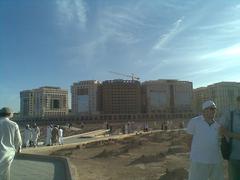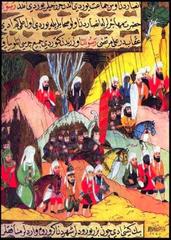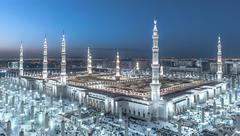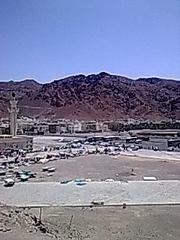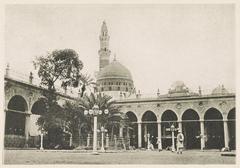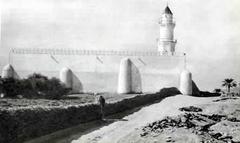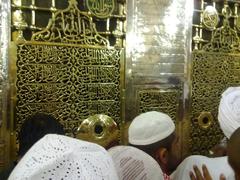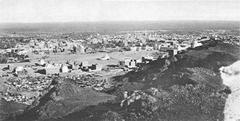Bani Bayadhah Mosque Visiting Hours, Tickets, and Medina Historical Sites Guide
Date: 04/07/2025
Introduction
Nestled in the historical quarters of Medina, Saudi Arabia, the Bani Bayadhah Mosque stands as a living testament to the city’s early Islamic heritage. With origins tracing back to the era of Prophet Muhammad (peace be upon him), this mosque is closely linked to the Ansar—the native supporters of the Prophet during the pivotal Hijrah migration in 622 CE. Built on the land of the Bani Bayadhah sub-tribe, it has played a significant role as both a spiritual center and a social hub, reflecting the community-centered ethos of early Islam.
Today, Bani Bayadhah Mosque continues to serve as a place of prayer and contemplation, offering visitors a chance to experience the spiritual and historical depth of Medina beyond its major landmarks. This guide provides all the essential details for planning a visit, including historical context, visiting hours, accessibility, etiquette, and travel tips. Whether you are a pilgrim or a history enthusiast, this article equips you with practical information and cultural insights for a respectful and enriching experience at this cherished site (madainproject.com, mexicohistorico.com, theislamicinformation.com).
Table of Contents
- Early Foundations and Location
- Historical Context and the Role of the Ansar
- Architectural Features and Preservation
- Religious and Social Significance
- Notable Narratives and Community Legacy
- Visiting Information
- Nearby Attractions
- FAQs
- Summary Table
- Conclusion
- References
Early Foundations and Location
Bani Bayadhah Mosque (Masjid Bani Bayadhah) is rooted in the early Islamic period and was constructed after the Prophet’s migration to Medina. Named for the Bani Bayadhah sub-tribe of the Ansar, the mosque is situated within the city’s historic quarters, in close proximity to other revered Islamic sites.
Its location is strategic for religious travelers: it lies less than 2 km from the Prophet’s Mosque (Al-Masjid an-Nabawi) and is easily accessible on foot, by taxi, or via local tour circuits. The area is pedestrian-friendly and well-signposted in both Arabic and English (mexicohistorico.com).
Historical Context and the Role of the Ansar
The Ansar of Medina were the first to embrace Islam and support Prophet Muhammad (PBUH) after his migration from Mecca. The Bani Bayadhah played a notable role in these formative years, with their neighborhood mosque serving as a center for worship, education, and community affairs.
Mosques such as Bani Bayadhah were established to foster communal worship and social cohesion among the various tribes of Medina. The Prophet himself was known to visit and pray in these tribal mosques, reinforcing their spiritual and societal importance (theislamicinformation.com, britannica.com).
Architectural Features and Preservation
Bani Bayadhah Mosque’s original structure reflected the simplicity of early Islamic architecture—mud bricks, palm trunks, and thatch. The design included a rectangular prayer hall and a mihrab indicating the qibla. While renovations over the centuries have modernized certain aspects, the mosque remains modest and community-focused, upholding its historical character (iqrasense.com, scribd.com).
Ongoing preservation efforts, supported by local authorities and Saudi Vision 2030, ensure the mosque’s continued accessibility and historical integrity (madainproject.com).
Religious and Social Significance
Bani Bayadhah Mosque is revered for its association with the Prophet and the Ansar. It served not only as a place of prayer but also as a venue for teaching the Qur’an and Sunnah, resolving community issues, and organizing charitable activities. These multifaceted roles illustrate the mosque’s enduring influence on Medina’s spiritual and social development (visitalmadinah.com).
Praying in such historic mosques is considered spiritually significant, connecting worshippers to the legacy of the Prophet’s companions (thepilgrim.co).
Notable Narratives and Community Legacy
While not the site of major battles, Bani Bayadhah Mosque played a vital part in the daily life of early Muslims. Oral accounts describe it as a gathering place for consultations, celebrations, and crisis management, exemplifying the decentralized, community-based model of worship in early Islam (lifeinsaudiarabia.net).
Visiting Information
Hours and Entry
- Open: Daily for the five daily prayers, from Fajr (early morning) to Isha (night).
- Entry: Free for Muslims. Non-Muslims are generally not permitted inside the mosque or the Haram area.
Accessibility
- Mobility: Basic ramps and accessible entrances are available, though facilities may be limited due to the mosque’s age.
- Transport: Accessible by foot, taxi, or ride-hailing from across Medina. The main airport (Prince Mohammad Bin Abdulaziz International) is 15 km away, with easy connections to the city center.
Dress Code and Etiquette
- Men: Long trousers and sleeved shirts.
- Women: Loose-fitting clothing covering arms and legs, and a headscarf. While abayas are not legally required, they are recommended within mosques (intosaudia.com, swirled.com).
- Shoes: Remove before entering the prayer hall.
- Behavior: Maintain quiet, respectful conduct; silence phones and avoid photography inside during prayers.
Travel Tips and Best Visiting Times
- Best Times: Early morning or late afternoon for tranquility and comfortable temperatures (November–March is ideal).
- Peak Seasons: Larger crowds during Hajj and Ramadan.
- Hydration: Bring water, particularly in summer.
- Language: Arabic is predominant, but English is widely used in hotels and tourist areas.
Guided Tours and Photography
- Tours: Local operators and hotels frequently offer guided tours, often including Bani Bayadhah Mosque as part of a broader Medina heritage circuit (saudiarabiatours.net).
- Photography: Permitted outside and in non-prayer areas; always ask permission before photographing people or inside the mosque.
Nearby Attractions
The mosque’s central location allows easy exploration of other important sites:
- Al-Masjid an-Nabawi: The Prophet’s Mosque, Islam’s second holiest site.
- Quba Mosque: The first mosque in Islamic history.
- Qiblatain Mosque: Where the qibla was changed from Jerusalem to Mecca.
- Jannat al-Baqi: Historic cemetery of the Prophet’s companions.
Markets, cafes, and local shops surround the area, offering a vibrant cultural experience (lifeinsaudiarabia.net).
Frequently Asked Questions (FAQ)
Q: What are the Bani Bayadhah Mosque visiting hours?
A: Open daily for the five prayers, typically from Fajr to Isha.
Q: Is entry free?
A: Yes, there are no ticket fees for Muslim visitors.
Q: Can non-Muslims enter?
A: No, non-Muslims are not permitted within the mosque or the central Haram area.
Q: Are guided tours available?
A: Yes, many local tour operators and hotels include the mosque in historical tours.
Q: What is the dress code?
A: Modest attire is required—long trousers and sleeves for men; loose-fitting, body-covering clothes and a headscarf for women.
Q: Is the mosque accessible for disabled visitors?
A: Some basic features are present, but the historic structure may limit full accessibility.
Summary Table: Key Facts
| Feature | Details |
|---|---|
| Location | Historic quarters of Medina, near Al-Masjid an-Nabawi |
| Established | 7th Century CE (Prophet Muhammad’s era) |
| Named After | Bani Bayadhah, sub-tribe of the Ansar |
| Entry Fee | None |
| Hours | Open daily, Fajr–Isha (prayer times) |
| Accessibility | Basic features; some limitations due to historic design |
| Dress Code | Modest clothing; headscarf for women |
| Guided Tours | Available through local operators |
| Nearby Sites | Masjid al-Nabawi, Quba Mosque, Qiblatain Mosque, Jannat al-Baqi |
| Preservation | Supported by Saudi Vision 2030 and local authorities |
Conclusion
Bani Bayadhah Mosque encapsulates Medina’s rich historical and spiritual legacy. As a site intimately connected to the early Muslim community and the Prophet’s companions, it offers visitors an authentic experience of Islamic heritage. Its modest architecture, welcoming atmosphere, and preserved traditions make it a must-visit for those seeking to understand Medina’s sacred landscape.
Plan your visit by considering the practical tips above, respect local customs, and enrich your journey by joining guided tours for deeper historical context. Download the Audiala app for real-time updates, travel tips, and more detailed guides to Medina’s historical sites. Stay connected with our social media channels for the latest in Islamic heritage tourism.
References and Further Reading
- Bani Bayadhah Mosque in Medina: Visiting Hours, History, and Travel Tips, 2025, madainproject.com
- Bani Bayadhah Mosque Visiting Hours and Historical Guide in Medina, 2025, mexicohistorico.com
- Bani Bayadhah Mosque in Medina: Visiting Hours, Tickets, and Travel Guide, 2025, wikipedia.org
- Bani Bayadhah Mosque Visiting Hours, Tickets, and Travel Guide to Medina Historical Sites, 2025, saudiarabiatours.net
- The Islamic Information: Significance of Madinah History, 2025, theislamicinformation.com
- The Pilgrim: How to Visit Madinah, 2025, thepilgrim.co
- Life in Saudi Arabia: Historical Ziyarat Places to Visit in Madina, 2025, lifeinsaudiarabia.net
- Intosaudia: Essential Guide to Saudi Culture Visitor Etiquette, 2025, intosaudia.com
- Swirled: Head Covering Rules for Tourists, 2025, swirled.com
